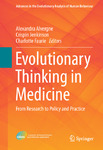| dc.description.abstract | Evolution in medicine?! Never heard of it! This quote, in essence, sums up the
reaction of a medical doctor who kindly accepted to review the proposal for this
book. Far from substantiating the received idea according to which doctors are
against any new approach to their field, it shows that health professionals know
little about the relevance of evolutionary thinking for medical practice. At first, this
may be surprising: the idea that evolution can inform medicine is not new—
Erasmus Darwin, Darwin’s grandfather and a medical practitioner, hinted at this
conceptual breakthrough more than 200 years ago—and evolutionary biologists
have pleaded for more evolution into medicine for about two decades. In addition,
medicine is repeatedly confronted to evolution: practitioners have to deal with
antibiotic resistance, the rapid changes of a virus, or the evolution of tumour cells.
Yet, evolution is not part of the medical curriculum of most universities and what is
more, most medical students and doctors have just “never heard of it”. At second
glance, however, this is not surprising.
Until recently, most evolutionary medicine publications did not really target
medical practitioners or were published in evolutionary rather than medical journals.
Further, most books on the topic are organized into a structure that reflects
evolutionary biology sub-fields which are not familiar to medical doctors (e.g. life
history theory, host–parasite co-evolution) rather than sub-fields of medicine (cardiology,
oncology, obstetrics). Medicine is highly specialized and already requires a
considerable amount of knowledge, and one cannot expect its practitioners to teach
themselves the basis of evolutionary biology that are required to dive efficiently into
the growing literature of evolutionary medicine, a still secondary discipline to
medicine. But this is not the whole story. For those medics who have “heard of it”,
the relevance of an evolutionary framework for the practice of medicine is yet to be
demonstrated. Some have argued that in the consultation room, evolutionary
thinking may offer little more than a nice story to tell, but will not fix the broken
arm. Are they wrong? Arguably the answer is neither yes nor no, but rather that it
depends on the field of specialization, the amount of attention it has received from
evolutionary scholars and the type of practical implication that is sought (communication with the patient, rethinking the hallmarks of a disease, finding new
avenues in cancer therapy, etc.). Still, the question of the impact of evolutionary
thinking for practice and policy is one to be asked explicitly. | en_US |

